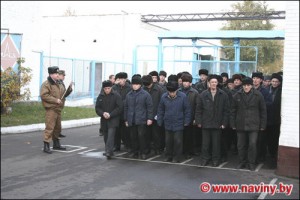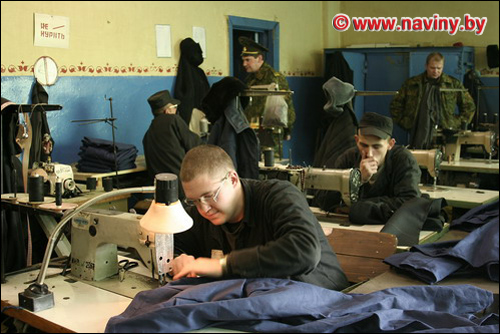The 6 people we support are all distributed among different penal facilities. In our country it depends on how grave the offense is. The offense can be ‘of no particular risk for society’ – up to 2 years of imprisonment, ‘misdemeanor’ – up to 6 years, ‘felony’ – up to 12 years, ‘especially grave crime’ – more than 12 years of prison.
Among penal facilities the most spread are penal colonies and prisons. Penal colonies have different regimes – common, reinforced, strict and maximum security. Those who committed a misdemeanor for the 1st time go to a common regime colony, those who committed a felony or misdemeanor for the 2nd time go to a reinforced regime colony, recidivists go to strict and maximum security colonies. The difference in regime is only in the amount of benefits and rights prisoners have – that is the number of dates, the amount of food and cloths supply from the outside per year, the sum of money which prisoners can spend per month and so on. Mikalai Dziadok is in a common regime penal colony and he has the right for 3 long-term (up to 3 days) dates and 3 short-term (up to 4 hours) dates a year, 120 kilos of additional food per year and about 20 euros of expenses per month. For the violations of the rules he has already been deprived of 60 kilos of food, one short-term date and his expenses are cut to 3 euros per month for half a year; his long-term dates are cut to 1 day only.

Alexandr Frantskevich, Ihar Alinevich, Pavel Syramolatau, Artsiom Prakapenka are in a penal colony with reinforced regime and have the same conditions minus 1 long-term date and only 17 euros of expenditures. For the violations of the rules inside the colony Alexandr Frantskevich was deprived of 1 short-term and 1 long-term date. Ihar Alinevich is obliged to pay off the damage inflicted by the crime, that’s why he has only 3 euros of monthly expenditures and his long dates are all cut to 1 day for the rest of his sentence.

Jauhen Vas’kovich was in a reinforced colony before, but after different rule violations he was moved to a prison.
Colonies are guarded places with different buildings – canteen, sleeping barracks, sports ground, etc., where prisoners can go outside (still inside the colony territory), meet other prisoners, work, play sports and so on. In colonies prisoners have to work, but there are some colonies where there’s no production and they just hang around. A prison is a guarded building where prisoners sit in cells for 6-10 people each and have the right to walk for 1 hour a day. They don’t work and can’t meet other prisoners apart from their cell. Long-term dates are forbidden, 1-2 (depending on the regime) short-term dates are allowed.

Dates are allowed only for relatives. Books are allowed only from the prison library or from 2 book parcels a year (2 kg each). Radical literature and print-outs are censored.